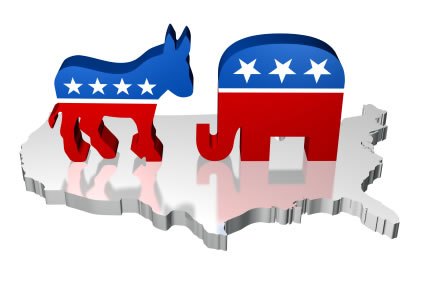Majority of Independents open to third party candidate for President

A new survey conducted by Public Policy Polling has found that 37% of Americans and 51% of Independents are open to supporting a third party candidate for President in 2012. And there is good reason to believe these numbers significantly underestimate the level of support for an alternative to the Democrats and Republicans.
According to the poll, which was released last week and conducted between January 14th and January 16th, 37% of Americans are open to the idea of supporting a third party candidate for President in 2012, while 45% are not and 18% are not sure. Of those who are open to a third party alternative to President Obama and his eventual Republican challenger, 48% express support for a centrist candidate who is more conservative than Democrats and more liberal than Republicans, while 30% want a candidate who is more conservative than Republicans and 16% want a candidate who is more liberal than the Democrats. The remainder express support for “something else” or are not sure. These numbers translate roughly to an 18-19% base-level support for a centrist, third party candidate among the electorate at large.
A look at the poll’s crosstabs shows that Independents are, unsurprisingly, most open to a third party candidate for President in 2012. 51% of Independents expressed openness to the idea, compared to 44% of Republicans and only 24% of Democrats. Given that Independents and Republicans are much more open to the idea of a third party candidate for President than Democrats are, there is good reason to believe that the Public Policy Polling survey significantly underestimates the level of support for an alternative to the deadlock of Democratic-Republican party politics.
40% of the PPP survey’s respondents were Democrats, 37% were Republicans and 23% were Independent or “Other.” However, numerous polls conducted over the last two years have found that more Americans now identify themselves as Independents than as Republicans or Democrats. A Pew Research survey from last November found that 37% of respondents identified themselves as Independents, compared with 30% who identified themselves as Democrats, and 26% who said they are Republicans. Similarly, an analysis by the Gallup organization from early January found that the percentage of Americans identifying themselves as Independents increased to 38% over the course of 2010, compared with only 31% who identified themselves as Democrats and 29% as Republicans.
Furthermore, a number of other surveys from this past fall indicate majority support for a third party or Independent alternative to the Democrats and Republicans. A NYT/CBS poll from last September, for instance, found that 54% say the country needs a third party. Similarly, a poll commissioned by The Hill in October found that 54% of respondents desired an alternative to the Democratic and Republican parties, including 67% of Independents, 49% of Democrats and 46% of Republicans.
Reflecting on the PPP survey’s disparity between Democratic and Republican support for a third party presidential candidate in 2012, Tom Jensen wrote at the Public Policy Polling blog:
“That should be a big red flag for the GOP when it comes to the possibility of nominating someone who the party base doesn't see as sufficiently conservative. Republican voters in Nevada, Alaska, Delaware, and Colorado this year showed they were willing to lose general elections to prove a point to the more centrist wing of their party.”
However, as is often the case in matters of this sort, the situation is likely more complicated than such an assessment would make it appear. A recent Rasmussen poll found that 46% of GOP primary voters would likely support a third party candidate if Sarah Palin did not win the Republican party’s nomination for President. But a Rasmussen poll from late last year found that 31% of GOP primary voters would likely support a third party candidate if Sarah Palin did indeed win the Republican party’s nomination for President.
Since Rasmussen is widely considered to be a Republican-leaning polling organization and Public Policy Polling is often said to lean toward the Democrats, as its sampling in the present poll would suggest, an obvious question arises: where are the polling organizations that lean toward Independents?




